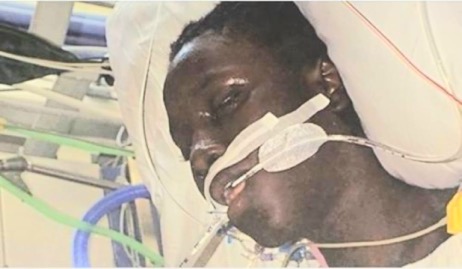
However, her procedure requires a replacement of two critical valves of her heart every ten years. This means Isatou would require a date with her doctors in 2020. “Gambia cannot do heart surgery here. We lacked both the equipment and the expertise to do this,” says cardiologist Lamin E.F. Jaiteh at the Gambia’s main referral hospital, the Edward Francis Small teaching Hospital (EFSTH) in Banjul, when contacted to shed light on Isatou’s situation.
Given her age at the time of the first surgery, Mr Jaiteh said Isatou’s condition left her with two choices: bioprosthetic or mechanical prothesis – former uses organic tissues from animals or donated human tissue, while latter is made from durable materials like metal or carbon. Former lasts about ten years, usually reserved for females under child-bearing age, and the other for men or women above childbearing because it requires frequent changes.
“The patient is a young female who was complaining of repeated episode of chest pain, palpitation - referring to a noticeably rapid, strong, or irregular heartbeat - and dyspnea (similar to suffocation or chest tightening) on exercise for about five years,” her medical report, signed by Dr Abubacarr Jagne, consultant physician and nephrologist at EFSTH stated.
An examination of her condition in 2023 reveals that Isatou felt no tenderness and no organ enlargement around her abdomen. By this time Isatou had undergone her second operation and replaced the valves, thanks to her second trip for the procedure in The Netherlands. But these procedures usually have side effects or may sometimes develop complications such as blocked blood flow to some parts of her body. So she requires constant monitoring.
“She has a previous surgical replacement of the mitral valves and aortic valve, which get re-stenosis most likely by blood clot, otherwise called blood stuck in 2011. This was within 10 years of insertion. She had another replacement to return to Netherlands for the replacement in December 2020,” the examination concluded.
Unfortunately for Isatou, this replacement procedures cannot be conducted in The Gambia, and even in many neighbouring countries. The nearby facility for this, in Fann Hospital, Dakar, requires a fee of CFA Francs 3.5 million, according to doctors at the EFSTH. A second facility in Dakar, which is privately owned, would cost at least 10 times more than Fann.
Already, the procedure in The Netherlands would cost her family Euros 20,000 – beyond the reach of most Gambian families, including herself. Most Gambian families live on less than $1 per day and poverty levels are sharp in relation to population growth.
So, a crowd funding launched by online platform in 2021, raised over Euros 800 and her family members began turning to philanthropists for help, to enable her to undergo the procedure and save Isatou’s life.
“She requires a standard facility to monitor the post-surgery situation of her replaced valves, which we cannot guarantee here. Otherwise, any sudden stuck of the said valves can result to her death,” cardiologist Jaiteh explained.
Isatou’s only option is to be closer to her doctors in The Netherlands, especially in case of any emergencies and for frequent monitoring; or risk dying when she returns to Gambia.





